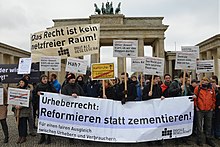This article needs to be updated. (May 2013) |

The ancillary copyright for press publishers[1] (German: Leistungsschutzrecht für Presseverleger) is a proposal incorporated in 2012 legislation proposed by the ruling coalition of the German government, led by Angela Merkel of the Christian Democratic Union (CDU), to extend publishers' copyrights. The bill was agreed by the Cabinet at the end of August 2012 and submitted to parliament on 14 November 2012. It was passed by the Bundestag on 1 March 2013 by 293 to 243, following substantial changes in the week before the vote.
In its original form, the law would have forced Internet content providers to pay fees, collected by a central clearinghouse,[2] to publishers for displaying their content: fees would have been levied for even short snippets of news made available by news aggregators and web search engines.[3] The intended effect would have been to force Google, a leading search engine, to pay publishers fees for display of news search results, causing the bill to be dubbed a "Google tax" by some.[4] It would give press agencies the exclusive right to publish press releases for commercial purposes on the Internet[5][clarification needed] and would require search engines such as Google to obtain licenses for using small text passages.[6] A Google spokesman called it "a black day for the Internet in Germany".[7] Many trade associations regard it as useless[8] and critics fear a reduction in diversity of opinion.[9] Wikimedia Deutschland regards this as dangerous "for the creators of free content in general and for providers of open content platforms in particular".[10] It was agreed between the coalition parties, the CDU and the FDP in their coalition agreement for the 17th session of the German Bundestag.
It passed in the Bundesrat March 22, 2013, was published in the Bundesgesetzblatt May 14, and came into force on August 1, 2013.
The publisher's right is the subject of an ongoing legal challenge by Google and has not yet generated significant revenue for German publishing groups.[11]
- ^ The terms "related rights" and "neighbouring rights" are also used, but they cannot conveniently stand on their own when not preceded by "copyright".
- ^ Matthew J. Schwartz (2012-08-22). "Germany wants to charge Google for news snippets". InformationWeek Government.
- ^ Eric Pfanner (2012-03-11). "Germany trying to cut publishers in on web profits". The New York Times.
- ^ Martin Brinkmann (2012-08-30). "Germany's Google Tax is a go". Ghacks Technology News.
- ^ "Ministerium nimmt Google ins Visier". N24 - Gesellschaft für Nachrichten und Zeitgeschehen mbH. 28 August 2012. Retrieved 30 August 2012.
- ^ "Geld von Google - Kabinett beschließt umstrittenes Leistungsschutzrecht". Spiegel Online - Netzwelt (in German). Hamburg: Spiegel Online. 29 August 2012. Retrieved 30 August 2012.
- ^ "Google lehnt Lizenzierungspflicht ab". Spiegel Online - Netzwelt (in German). Hamburg: Spiegel Online. 29 August 2012. Retrieved 30 August 2012.
- ^ "Leistungsschutzrecht: Die Axt an der Wurzel der Marktwirtschaft". FOCUS Online (in German). 29 August 2012. Retrieved 30 August 2012.
- ^ "Leistungsschutzrecht: Suchmaschinen müssen zahlen". Welt Online (in German). 30 August 2012. Retrieved 30 August 2012.
- ^ Hedemann, F. (15 June 2012). "Leistungsschutzrecht: Wikipedia bald ohne Links?". t3n. yeebase media GmbH. Archived from the original on 4 September 2012. Retrieved 30 August 2012.
- ^ "The ancillary copyright for press publishers in Germany". LSR-Aktuell. Retrieved 2019-02-12.
© MMXXIII Rich X Search. We shall prevail. All rights reserved. Rich X Search
